The United Kingdom competed in the Eurovision Song Contest 1999, held on 29 May 1999 at the International Convention Center in Jerusalem, Israel. The British Broadcasting Corporation (BBC) organised a public selection process to determine its entry for the contest, The Great British Song Contest 1999. Eight songs competed over two rounds, with four songs selected through a radio-broadcast semi-final to advance to the televised final round, held on 7 March 1999, where viewers selected the winning entry through televoting. Girl group Precious received the most votes and were selected to represent the nation in the contest with the song "Say It Again".
The United Kingdom participated in the Eurovision Song Contest 2000 with the song "Don't Play That Song Again" written by John Springate and Gerry Shepherd. The song was performed by Nicki French. The British entry for the 2000 contest in Stockholm, Sweden, was selected via the national final A Song for Europe 2000, organised by the British broadcaster BBC. Eight acts competed in the national final which consisted of a semi-final and a final, during which the winner was selected entirely through a public televote.

"Love Shine a Light" is a song by British rock band Katrina and the Waves written by Kimberley Rew. It represented the United Kingdom in the Eurovision Song Contest 1997 held in Dublin, resulting in the country's fifth and most recent win at the contest. It was released as a single on 28 April 1997 and was later included on the band's ninth studio album, Walk on Water (1997), serving as the album's lead single.

Nicola Sharon French is an English singer. She is best known for her 1995 dance cover version of "Total Eclipse of the Heart", which reached the US and UK top 5, and for representing the United Kingdom in the 2000 Eurovision Song Contest in Stockholm.

"Total Eclipse of the Heart" is the lead single by Welsh singer Bonnie Tyler from her fifth studio album, Faster Than the Speed of Night (1983) written and produced by Jim Steinman and recorded in 1982, released as a single by CBS/Columbia in 1983.

Eurovision: You Decide is the most recent name of a BBC television programme that was broadcast annually to select the United Kingdom's entry for the Eurovision Song Contest. The show had previously gone under several other names, including Festival of British Popular Songs (1957), Eurovision Song Contest British Final (1959–1960), The Great British Song Contest (1996–1999), Eurovision: Making Your Mind Up (2004–2007), Eurovision: Your Decision (2008), and Eurovision: Your Country Needs You (2009–2010), but was known, for most of its history, as A Song for Europe.

Niamh Kavanagh is an Irish singer who sang the winning entry at the Eurovision Song Contest 1993.
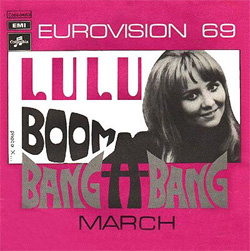
"Boom Bang-a-Bang" is a song recorded by Scottish singer Lulu, with music composed by Alan Moorhouse and lyrics by Peter Warne. It represented the United Kingdom in the Eurovision Song Contest 1969, held in Madrid, and became one of the four winning songs. It made No. 2 in the UK Singles Chart and was a major hit throughout Europe.

"The Voice" is a song recorded by Irish singer and composer Eimear Quinn with music composed and lyrics written by Brendan Graham. It represented Ireland in the Eurovision Song Contest 1996 held in Oslo, resulting an unprecedented fourth win in five consecutive years for a country in the contest, being Ireland's seventh overall win, and its last win to date. The single, released by Ainm Records, CNR Music and Polydor, peaked at number three in Ireland and number nine in Belgium, and was a top-30 hit in the Netherlands and a top-40 hit in the UK and Sweden. It features subliminal voices by Graham and Tracey Cullen.
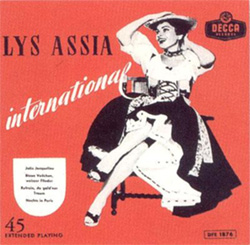
"Refrain" is a song recorded by Swiss singer Lys Assia with music composed by Géo Voumard and lyrics written by Émile Gardaz. It represented Switzerland in the inaugural edition of the Eurovision Song Contest and became the first ever winner of the contest.

"Net als toen" is a love song recorded by Dutch singer Corry Brokken with music composed by Guus Jansen and Dutch lyrics written by Willy van Hemert. It represented the Netherlands in the Eurovision Song Contest 1957 held in Frankfurt, resulting in the country's first win in the contest.

"Save Your Kisses for Me" is a song recorded by British group Brotherhood of Man, written by Tony Hiller with band members Lee Sheriden and Martin Lee. It represented the United Kingdom in the Eurovision Song Contest 1976 held in The Hague, winning the contest.

"Invincible" is a song recorded by Swedish singer Carola Häggkvist, with music composed by Thomas G:son, Bobby Ljunggren, and Henrik Wikström and lyrics written by G:son and Häggkvist. It represented Sweden in the Eurovision Song Contest 2006, held in Athens, placing fifth.
Cyndi Louise Almouzni, best known at the beginning of her music career in the United States as Cherie, is a French pop and dance music singer coming from Marseille. Her 2004 hit "I'm Ready" hit number one on the Hot Dance Music/Club Play chart.
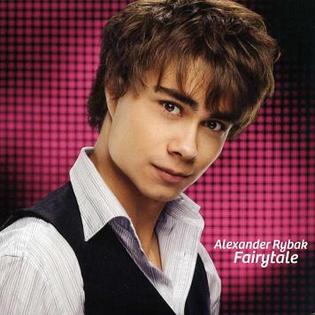
"Fairytale" is a song composed, written, and recorded by Belarusian-Norwegian singer-songwriter Alexander Rybak. It represented Norway in the Eurovision Song Contest 2009 held in Moscow, winning the contest. It is the first single from Rybak's debut album Fairytales released on 29 May 2009 just after the contest.
Norway participated in the Eurovision Song Contest 2001 with the song "On My Own" written by Ole Henrik Antonsen, Tom-Steinar Hanssen and Ole Jørgen Olsen. The song was performed by Haldor Lægreid. The Norwegian broadcaster Norsk rikskringkasting (NRK) organised the national final Melodi Grand Prix 2001 in order to select the Norwegian entry for the 2001 contest in Copenhagen, Denmark. Twelve entries competed in a show that took place on 24 February 2001 and the winner was determined over two rounds of voting from a five-member jury panel and a regional televote. The top four entries in the first round of voting advanced to the competition's second round—the superfinal. In the second round of voting, "On My Own" performed by Haldor Lægreid was selected as the winner.

"1944" is a song composed and recorded by the Ukrainian musician Jamala, with it including lyrics by both her and performer Art Antonyan. It represented Ukraine in the Eurovision Song Contest 2016, and the song won the event with a total of 534 points.
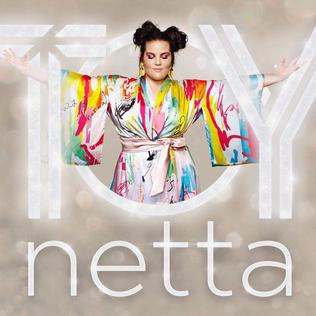
"Toy" is a song by Israeli singer Netta Barzilai, composed and written by Doron Medalie and the song's producer Stav Beger, the song was released on 11 March 2018 along with its official music video clip, which was directed by Keren Hochma. It represented Israel in the Eurovision Song Contest 2018 held in Lisbon, winning the contest.
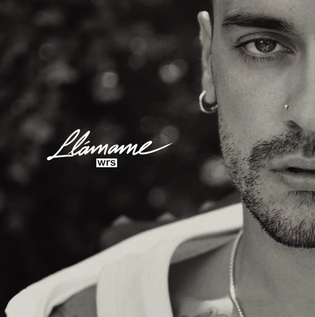
"Llámame" is a 2022 song by Romanian singer Wrs. The song represented Romania in the Eurovision Song Contest 2022 in Turin, Italy after winning Selecția Națională2022, Romania's national final.
John Springate is an English singer, musician, songwriter and music producer. The hits he has composed include "Don't Make Promises " by the G. Band, "Don't Play that Song Again" for Nicki French which was also a Eurovision Song Contest 2000 song and "Nothing But Promises" for Kelly. He produced the single "A Little Boogie Woogie in the Back of My Mind" and the Let's Boogie album for Shakin' Stevens. He also played backup for Johnny Johnson and the Bandwagon and was a member of Clem Curtis & The Foundations and The Glitter Band.














